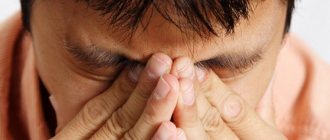Speedophobia is a panicky fear of being sick with AIDS. The disease belongs to the category of mental personality disorders. Basically we are talking about hypochondria, when a person is sure that he is seriously ill, despite the negative result of clinical tests and doctors’ assurances that his experiences are groundless. In most cases, hypochondria develops in impressionable people. Men and women in the age group from 20 to 30 years are at risk.
What does it represent?
As already mentioned, speedophobes are confident that they are carriers of HIV infection. And if not yet, then in the near future they will definitely become infected from someone. And, accordingly, they will die a painful death.
They spend countless amounts of money on testing. The negative results of which do not satisfy them at all.
Why do they demand to take their blood again, change clinics and specialists. And with every slight cold they run to the doctor to get checked.
In fact, this is a serious disorder that has a strong impact on a person’s social life, his financial situation and even his health.
For example, he can completely exclude sex from his life, since there is a high probability of becoming infected during sexual intercourse. Accordingly, he does not start new relationships, or breaks off existing ones, if there were any.
Despite the fact that he is a frequent patient of diagnostic laboratories, he may refuse treatment, especially if it involves surgical intervention.
Since it is during the operation or during a blood transfusion that there is a chance of infection.
Unfortunately, this happens, although extremely rarely. But 1 case out of 1000 is enough for a phobe to get scared and risk his life by refusing such radical treatment.
In severe cases of the disorder, people stop leaving the house and eating certain foods. Because there are myths that, for example, HIV is injected into bananas with a needle.
It’s dangerous for them on the street, because it’s unclear how many AIDS patients are around, what if at least one of them turns up nearby.
Walking at night is also not an option. Since there is a version that the infected deliberately leave infected needles in public places so that people accidentally stumble upon them and get sick.
How to protect yourself from speedophobia?
And finally, it is worth mentioning the methods of preventing HIV infection that any person should know. This will help impressionable people reduce their fear of contracting HIV and prevent the development of a phobia.
- Avoid promiscuity.
- When having sex with a new partner whom you do not know very well, be sure to use condoms.
- Don't do drugs.
- Strengthen your immune system.
- Avoid unnecessary stress, as it weakens the body's protective functions.
- Read less about AIDS, do not look for information on the Internet. Most information about the disease is not true.
- Adequately assess the risks of HIV infection.
For a normal, fulfilling life, it is necessary to pay attention not only to physical, but also to mental health. A person with a healthy, strong psyche is less susceptible to phobic disorders.
Symptoms
Behavioral
- Constantly feeling themselves for the presence of enlarged lymph nodes is one of the signs that a person is progressing with AIDS.
- With a slight cough, the alarm is raised, since it is also one of the symptoms of the presence of a terrible disease. And if the cough is intense, then they experience such serious horror that they are unable to lead their usual lifestyle, sleep and eat.
- If they find out that there are people around them who test positive for HIV, they will avoid meeting him, despite how significant, beloved, and dear he is. Nothing will make a phobe even stand next to him. Despite the fact that the infection is not transmitted through hugs, it is transmitted through airborne droplets. The very thought that this person is sick provokes panic. And no rational arguments will help calm him down.
- Specialized literature is carefully studied. Therefore, any debate with them on the topic of AIDS is completely useless; they are well-read and argue their opinions based on scientific facts, stories from the lives of other people, and so on. That is, you will claim that if you touch an infected person, nothing bad will happen - in response, he will tell you several cases when this turned out to be real.
- In some cases, the opposite situation is observed when the phobe flatly refuses to undergo examination, because he is afraid to find out about the positive test result. He does not visit hospitals in principle, which is why he risks his health and life. It is especially dangerous if he is the guardian of a minor child. Since he will not receive full treatment in the event of even a common cold.
Somatic
- Insomnia occurs against the background of anxiety. There may be nightmares in which the phobe actually becomes infected and dies.
- There are changes in appetite. Some lose it completely, while others, on the contrary, absorb everything they see without experiencing saturation. This is how they try to cope with anxiety.
- During panic attacks, a person feels as if he is suffocating. His heart rate increases, his blood pressure rises and pain appears in the chest area. Consciousness at such a moment becomes tunnel-like. That is, there is only one thought in my head that he is dying and it is necessary to urgently find a way out of the situation in order to be saved.
- Sometimes there is hysteria with loud crying and screams. Nausea, vomiting, limb tremors, diarrhea and loss of consciousness.
- Increased sweating, despite the room temperature.
- Due to anxiety, a person suffers from headaches, skin rashes, fever, chronic fatigue and drowsiness.
Consequences, destructive impact
Constant fear can cripple your life. People living with the fear of contracting AIDS often tend to commit suicide. The inability to influence the situation, obsessive states lead to destructive effects. Psychotherapists claim that such a manifestation often becomes the reason for a radical change in the life of a speedophobe. The form of hypochondria is characterized by several components.
- Serious financial costs for frequent testing. This includes the indiscriminate purchase and administration of medications, examinations and payment of online specialists to re-check the results.
- Negative interpretation of any reaction of the body, search for symptoms. A slight cough, sore throat and even a runny nose are defined as a manifestation of HIV infection.
- Increased sensitivity and heightened sensations. A mild headache seems more intense, and a slight rash is irrefutable evidence of the disease.
- A persistent state of stress. Nervous conditions cause insomnia, rashes, and rapid heartbeat. The speedophobe perceives this as a manifestation of AIDS.
Experts in the field of mental disorders say that sincere belief in illness can cause physical ailments. Constant consultations and tests will not only not help, but will also confirm the patient’s belief in his infection. It is not recommended to take antidepressants and tranquilizers without consulting a specialist.
Causes
Psychological trauma
Speedophobia can begin to develop if someone around you has become infected with this infection. And, even more so, if you had to watch him slowly fade away, die painfully. Moreover, if he lived or lives in the same apartment.
It happens that one of the family members categorically does not accept someone who is sick and tries to cope with his fear, turning others against him so that he moves out and does not endanger the lives of loved ones.
And those who are not sufficiently aware of the real ways of transmitting AIDS can really panic.
Children can be told about terrible symptoms if they come even within a meter of such a person. This naturally causes horror and provokes a phobia.
And it happens that a suppressed feeling of guilt, for example, for treason, manifests itself in the form of obsessive thoughts that the test results will now be positive.
In this way, a person unknowingly punishes himself, tormenting him with anxiety and insomnia. Or he worries that the family partner will not find out about this betrayal and the relationship with him will not collapse, since it is very valuable.
And hiding traces of unprotected sexual intercourse is not so easy if someone was unhealthy.
That is, the person believes that there will definitely be retribution for immoral behavior. Moreover, if she is part of a risk group (uses drugs, often changes partners, uses sex services, and so on).
Personality traits
People prone to hypochondria, that is, who are afraid of getting sick and are always looking for symptoms of dangerous diseases, may well have speedophobia.
They attach importance to the slightest changes in well-being. For example, if their throat hurts a little, they panic because they attribute their illness to the fact that they have contracted HIV infection. The idea that this is a common cold is not at all interesting, so it does not arise.
Under systematic stress, which a person simply does not have time to cope with, his psyche weakens and fails due to the fact that it cannot withstand the stress.
Directly speedophobia - if, for example, at that moment he learned that someone fell ill with this disease, or even died from it.
Or doctors mistakenly diagnosed him with an infection. And while the repeated results came, he acquired a phobic disorder from anxiety.
Development of speedophobia against the background of hypochondria
As mentioned above, the fear of contracting AIDS is more common in people suffering from hypochondria. The reasons for this are as follows:
- Hypochondriacs are very concerned about their health. It seems to such a person that a terrible disease could strike him at any moment. AIDS is one of the most discussed incurable diseases in society. Therefore, it seems to the hypochondriac that sooner or later it will affect him too. Although in fact, information about HIV is greatly embellished. The infection is transmitted sexually and through blood. It is impossible to simply become infected with AIDS, even if you communicate with a carrier of the infection.
- AIDS has no clear symptoms, so any increase in temperature, enlarged lymph nodes, or malaise causes panic in a hypochondriac. He can attribute a common cold to an incipient disease. And if he has unprotected sexual intercourse, this may be a reason to urgently run to the hospital and get tested.
- If a person leads a promiscuous lifestyle, often changes sexual partners, uses drugs, etc., he is worried about possible infection. Gradually, this anxiety can develop into pathological fear.
Treatment
If you experience a mild level of anxiety when taking an HIV test, but this anxiety does not affect your life in any way, then everything is fine.
If you notice that your health has worsened due to constant anxiety, and you have begun to limit contact with people, then it’s time to go to a specialist.
Since a phobic disorder may well develop into depression, from which it is sometimes difficult to recover.
It provokes a number of somatic diseases, and also leads to attempts to commit suicide. Because there is no more strength left to live in torment and fear. The only way out, paradoxically, seems to be death.
Also, speedophobia often leads to personality degradation (you will learn more about what it is here). Therefore, it is recommended to visit a psychotherapist or psychiatrist, and not self-medicate.
In the process of therapy, you will be able to understand the reasons why you are “consumed” by fear and anxiety.
This is extremely important and provides information on how to deal with a phobia. Each person requires an individual approach.
The psychologist will, if necessary, refer you to a psychiatrist if the matter has gone too far and physical ailments have appeared.
Let’s say that for insomnia, the doctor will prescribe sleeping pills, antidepressants in case of depression, lack of desires and any feelings other than horror and anxiety.
If you become irritable, hot-tempered and lose control of yourself, then a sedative will relax the nervous system.
This comprehensive approach ensures recovery, without the likelihood of relapse, as the physical, mental and emotional state returns to normal.
A person discovers other ways to satisfy his needs that are constructive and do not destroy his life.
Characteristic signs
The fear of contracting AIDS is inherent in any person, but heightened perception leads to the development of a phobia. The disorder is accompanied by psycho-emotional manifestations and physical ailments caused by psychosomatics. The first include:
- increased attention to health and well-being;
- frequent contact with medical professionals for consultations and tests;
- negative interpretation of the results, seeking a second opinion;
- change in the usual rhythm of life;
- giving up previously favorite activities for fear of becoming infected in any way;
- searching the Internet for confirmation of your own guesses.
And most importantly: he does not miss events related to AIDS.
Somatic disorders that arise as a result of constant stress and anxiety worsen the condition until physical ailments appear. Migraines, headaches and weakness worsen. The temperature rises and the general condition worsens. Among the symptoms on the forum you can see complaints of increased fatigue, apathy and skin rashes.
Recommendations
- Practice relaxation techniques to relieve stress and anxiety. Meditation will allow you to gain a sense of inner harmony. And at least for some time they allow the nervous system to rest and recover.
- Create. Creativity helps with intense experiences. Let it be drawing, singing or dancing. Be sure to release the energy that is inside you, then there will be no “stagnation”, and, accordingly, frustration. For example, in psychotherapy, a fairly effective method is when a person draws an image of his fear, then destroys it, tearing it, crumpling it.
- If you devote all your free time to studying materials about AIDS, then try to occupy yourself with something else during these periods. Join a gym, go on a trip, find a hobby that brings you pleasure. And be sure to do something every day that will make you smile. If you have forgotten what brings happiness and what you like, be sure to remember and explore.
- If you feel unwell or in pain, refrain from using Google to diagnose your condition. Be sure to make an appointment with a doctor you trust.
Drug therapy
Under no circumstances should you prescribe antidepressants to yourself, as they have many side effects. Recent studies have shown that inhibitors help in combating the symptoms of speedophobia. These medications help slow down some chemical reactions in the body and, as a result, relieve a person from depression and obsessive fear.











